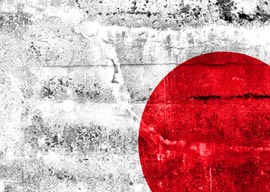
January 17, 2015

Source: Shutterstock
This is a good time to write about a nation’s resilience in the face of calamity. I am referring to the stoic discipline with which the Japanese bore hardship and the death of 15,000 people in March 2011 following a 9-magnitude earthquake, the strongest ever known to have hit Japan. I can remember the TV coverage as if it were yesterday. Very young and very old Japanese forming a long orderly line for disaster supplies. No looting whatsoever, à la in Los Angeles or New Orleans; no weeping on camera for the world to send more funds, just plucky resolve (gaman in Japanese) and ganbaru, to endure with pride.
As anyone who is familiar with Japan knows, tenacity is highly celebrated both as an individual and as a collective trait. The recent outrages in Paris, and the collective dignity of the millions who marched following the murders of innocents, brought back memories of Japanese stoicism, a national trait that has served the country well, especially after the disastrous end of World War II.
Just about the time the earthquake hit Japan, my friend Peter Livanos gave me a gift that is probably the one I treasure the most of all my possessions, a samurai sword of rare value and provenance, one that embodies the samurai’s code of Bushido, and one of the most outstanding examples of Japan’s highly skilled craftsmanship. The workmanship and quality of Peter’s gift far surpasses that of Western Damascus and Toledo blades, and for my last birthday his gift to me was an Imperial Japanese Navy Admiral’s flag, finished by hand, and as rare as the sword, as there were apparently a total of only 32 officers who reached Admiral’s rank between 1897 and 1945. I keep both gifts in one room, along with any medals I may have won throughout my life in sport, alas, not in war.
Peter Livanos is a very generous man whose father was a friend of mine and whose mother I’ve known since childhood. (Although rich from both sides, he is a self-made man, and that really is rare, and certainly not a trait found in my family.) He and I had a good laugh during dinner about the “hachimaki” of a kamikaze pilot he had included with his gift. This is the cloth with the rising sun symbol the pilots wore; karate fighters still do to this day.
“How did this survive him?” I asked Peter. It did look very worn.
“How do you know he flew?” he answered.
Peter has a variety of friends, none of whom are what is known as socialites, i.e., people who do absolutely nothing but go to parties and say dumb things. He reads history nonstop, sails with his wife and four children in faraway places, flies in his G550 on work-related trips, and competes in classic car rallies, a collection of which he keeps in Switzerland. If most billionaires were like him, this would be a far better place to live in, and I don’t mean the winter resort he and I keep as a base. But back to tenacity, dignity, and the manner in which the Japanese deal with disaster.
No Islamic cells are allowed in Japan, and definitely no madrasas. Muslims are not allowed to rent in Japan, and Japan has a negligible number of embassies in Muslim countries. The importation of any Koran published in Arabic is forbidden in Japan, and Arabic is not taught in Japanese universities. Permanent residence is not given to Muslims, nor citizenship. No political leaders or Prime Ministers from Islamic nations have visited Japan. (I found this data on the Internet with the help of a friend, as I am Internet illiterate, and although I concur 100 percent, I cannot vouch for its accuracy.) No wonder the Japanese have only deflation and the Chinese to worry about. Banzai!